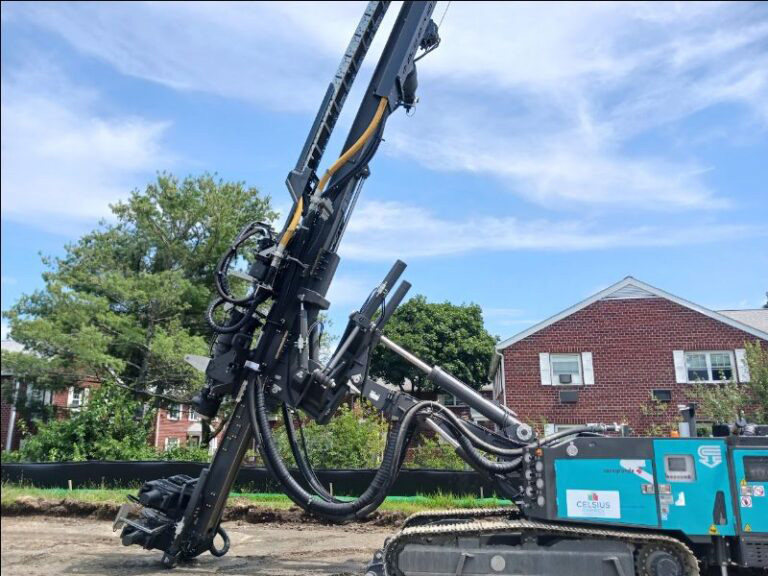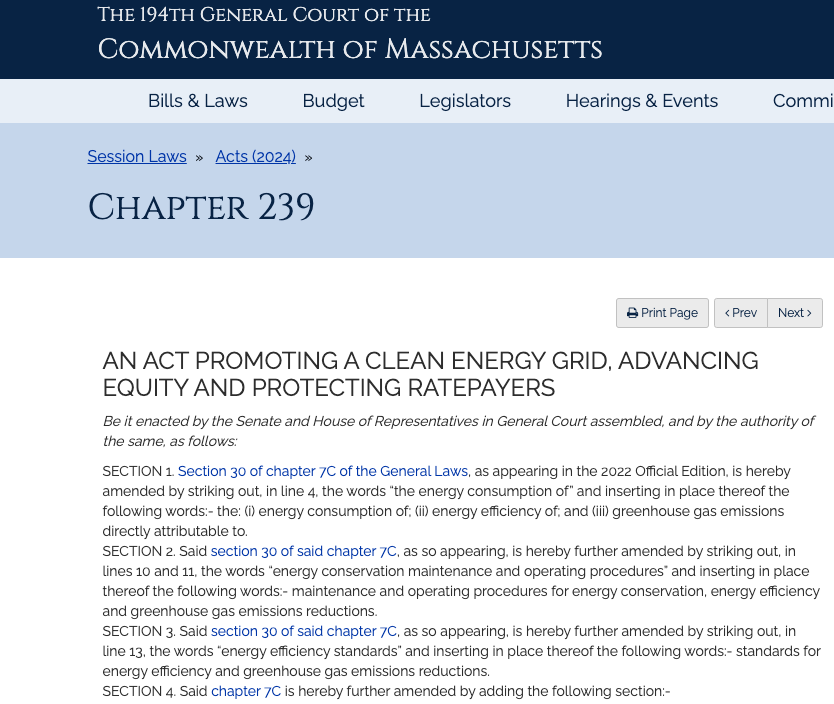Mass. Climate Bill Paves Way for Gas Companies to Lead Geothermal
| . Posted in News - 0 Comments
By Eric Weld, MassLandlords, Inc.
From out of intense legislative negotiations last summer over the state’s new climate change bill, gas companies emerged with considerable power in the ongoing transition away from fossil fuels. Partly as a result, a geothermal pilot project, operated in Framingham by Eversource, has gained increased scrutiny. Eversource is one of the state’s largest gas companies.

Eversource, one of the state’s largest gas companies, bored 90 holes deep into the neighborhoods around Concord Street in Framingham to create a series of pipes as part of its geothermal network pilot. The state’s new climate law allows gas companies to broaden their scope of service to add geothermal energy service. Image: Eversource source photo.
An Act Promoting a Clean Energy Grid, Advancing Equity, and Protecting Ratepayers, Ch. 239 of the Acts of 2024, became law on Nov. 21, 2024, following a long period of wrangling between the house and senate that pushed the bill beyond the close of the legislative session. The law is the third climate-related legislation adopted by the state since 2022. It follows on the heels of climate packages signed by Gov. Charlie Baker in 2021 and 2022 that codified the state’s commitment to greenhouse gas reduction, and redefined reduction targets to 50% of 1990 levels by 2030, 75% by 2040, and to net zero carbon emissions by 2050.
The law notched some restrictions on gas companies in expanding natural gas service, in an effort to nudge the state toward its decarbonization goals. At the same time, it also redefined their scope of service to include geothermal energy, and continued gas utilities’ power of eminent domain.
A List of Climate Change Initiatives
Ch. 239 also includes a litany of provisions that build on preceding climate change legislation pushing the state and its citizens to reduce and eventually eliminate fossil fuel combustion.
Landlords and renters may be most impacted by the law’s incentives to expand electric vehicle charging stations, and adjustments to income eligibility for energy assistance. Other provisions include empowerment of residents living near newly proposed energy projects, who will have input in permitting and siting of new infrastructure; and a change to include “embodied carbon” in the management of greenhouse gas emissions.
These provisions have been broadly covered across other media.
We want to examine the carve outs in the law that favorably position gas utilities to compete for a swath of new demand for renewable energy, and potentially take private land for public use.
Gas Company Plus Geothermal
The new climate change law permits an expansion of the definition of “gas company” in a way that broadens allowable services to also include providing geothermal energy. “A gas company may make, sell or distribute utility-scale non-emitting thermal energy, including networked geothermal and deep geothermal energy,” states the law’s Section 47.
The term “gas company” itself is antiquated. It applies to any corporation that provides natural gas energy service. But many of these companies have long provided energy services beyond just natural gas. S. 47 acknowledges this. “‘Gas company,’ a corporation originally organized for the purpose of making and selling or distributing and selling, gas within the commonwealth, even though subsequently authorized to make or sell electricity.” In that regard, it could be argued, a redefinition to include geothermal energy was necessary.
But the expanded definition is also practical, writers of the law might say. Gas utilities own infrastructure, lots of it: miles of underground pipelines, fleets of equipment, storage and processing facilities, compression and monitoring stations, not to mention legions of trained personnel.
While some of the very services these companies offer – sales and distribution of gas-fired energy – is a contributor to climate change, they will also play, and are playing, an integral part in moving away from use of their traditional product in favor of non-polluting forms of energy, such as geothermal. As such, their infrastructures – which are huge and expensive to develop – are already in place and can be more easily converted to renewable services, such as geothermal, than it would be for a new company to start from scratch.

Chapter 239 of the Acts of 2024, the new Massachusetts climate law, is the third legislation in a three-year period addressing climate change and seeking to codify the state’s zero carbon emission reduction goals. The latest climate bill positions gas companies to lead the way in developing geothermal networks, such as the Eversource pilot network in Framingham. Image: cc by-sa mass.gov.
All Eyes on Framingham Pilot Project
In fact, Chapter 239’s allusion to networked geothermal for gas companies nods to Eversource’s pilot project in Framingham that links together 37 buildings of mixed use for geothermal energy. The pilot is the first geothermal system operated by a public utility in the nation. (Networked geothermal systems have been in place on some college campuses for several years. Mt. Holyoke College and UMass-Lowell have geothermal systems in place, and Smith College is amid installation.)
Geothermal energy has been around for a while, used around the world in large-scale and small, individual settings. It is by far the most efficient form of energy available because it uses the very stable temperatures beneath the earth’s surface (~55 degrees Fahrenheit) to naturally warm or cool indoor temperatures above ground. Geothermal systems achieve this by constantly circulating fluid through underground pipes, where it’s either warmed or cooled as needed, then back above ground and through buildings’ interiors, where the affected fluid conditions the air.
Geothermal energy is not new, but networked geothermal systems like the Framingham project, that link together multiple customers in their neighborhood, are new.
The Framingham pilot project went online with its first customers in 2024 and will be monitored for two full heating-cooling seasons to determine its effectiveness, efficiency and viability as a model. It is a closely watched project, in and beyond Massachusetts, partly because of its potential to provide a viable pathway away from fossil fuel energy for whole communities of customers at a time. If deemed successful, it could unleash a trend for other utilities and energy companies to develop similar geothermal networks, and make a huge difference in achieving zero carbon emissions.
National Grid, the state’s largest public energy utility – or “gas company” in outdated parlance – also has geothermal network projects in stages of development, in Lowell and Boston, with plans to launch in 2025.
Advantage: Gas Companies
There are six investor-owned natural gas companies operating in Massachusetts, and four municipal gas companies. There are also nearly two dozen companies that provide geothermal services, a few of which specialize in that energy source.
With their infrastructures, resources and access to millions of customers, the largest gas companies – Eversource, National Grid and Berkshire Gas Company – will have clear advantages in building and expanding geothermal networks.
Continued Power of Eminent Domain
The latest climate law continues the right of Massachusetts gas companies and other energy providers to apply for eminent domain in siting pipelines, energy generation and other facilities. Power companies are also granted the right to enter private lands to conduct surveys to inform eminent domain requests. Gas and energy companies may petition the Department of Public Utilities’ (DPU) Energy Facilities Siting Board for taking private property in order to construct energy facilities after failed attempts to reach an agreement with landowners. They are also required to provide copies of petitions to the city or town and property owners.
The board is empowered, in the climate change law, to consider public interest in its adjudication of eminent domain. The board is required to hold at least one public hearing in a municipality affected by the eminent domain request.
There are a few cases of eminent domain exercised in Massachusetts going back several decades, mostly for surveying purposes, some by out-of-state companies. For example, Western Massachusetts Electric Company, a subsidiary of Eversource, petitioned the DPU in 2011 to take land in West Springfield and Chicopee for easements needed for transmission lines. Tennessee Gas Pipeline LLC took land by eminent domain in Otis State Forest in 2016 for pipeline expansion, and eventually paid the state $640,000.
It’s unclear how the power of eminent domain may be used going forward. However, as gas companies are newly empowered to pursue networked geothermal projects, and if such projects become a trend, it’s conceivable that eminent domain petitions might increase. Networked geothermal sites require boring miles of deep wells for running pipes, as well as land for above-ground operation facilities.
Eminent domain requests may also be affected by the climate law’s expanded rights of residents living in areas of proposed new energy facilities to challenge permits.
Hard-fought Restrictions on Natural Gas
While the new climate law positioned gas companies to lead parts of the state’s transition to non-carbon-emitting power sources, it also ended some of the companies’ options for expanding natural gas sales and service.
The bill ends the “right to service law,” a requirement that natural gas companies must provide gas service to any customer in their area who requests it. Instead, the new law requires them to consider if new gas service requests align with the state’s carbon reduction goals, and gives them the right to offer alternative energy service when it’s available. Alternatives could include geothermal in the near future.
The bill also allows utilities to retire segments of leaky gas line or apply short-term fixes instead of replacing them at high cost. This is an alteration to the state’s Gas Leaks Act.
Circuitous Route to Governor’s Desk
The climate change law was delayed more than a year as lawmakers in the house and senate debated its impacts on gas companies.
Following legislative negotiations spanning multiple sessions, the bill passed in the senate in summer 2024, but stalled in the house for several weeks and beyond the end of the 193rd session in July. Some house lawmakers hoped for less robust reforms for natural gas utilities. Legislators in both chambers continued to negotiate beyond the session and reached a compromise bill for the governor’s signature.
The November enactment of the law might be significant. Massachusetts was the first state to pass climate legislation after the Nov. 5, 2024, national election, and the law could serve to codify important climate initiatives. Already, within the first days of the new presidential administration, climate change policies have been scaled back. The new administration has stopped issuing new permits for wind farms and immediately began the process of withdrawing from the Paris Agreement, an international climate change treaty, for the second time (joining Iran, Libya and Yemen as the only countries not adopting the agreement).
Policies always change when a new presidential administration assumes governmental control. Given the layers of federal government, it’s difficult to predict which specific policies will further shift. However, on the campaign trail, the president pledged to repeal the Inflation Reduction Act. The IRA, signed into law by President Biden in August 2022, includes extensive initiatives and funding to transition away from fossil fuel energy and mitigate climate change-related impacts. If the current administration follows through on that pledge, in full or part, it could mean sizable decreases in federal funding for climate change-related endeavors. Some Massachusetts lawmakers are calling for increased spending of remaining IRA funds in anticipation of possible federal claw back attempts.
Massachusetts has a long way to go to reach its greenhouse gas reductions and net zero emissions goals by 2050. To achieve those goals, it will need all the cooperation it can get from gas companies and property owners.






